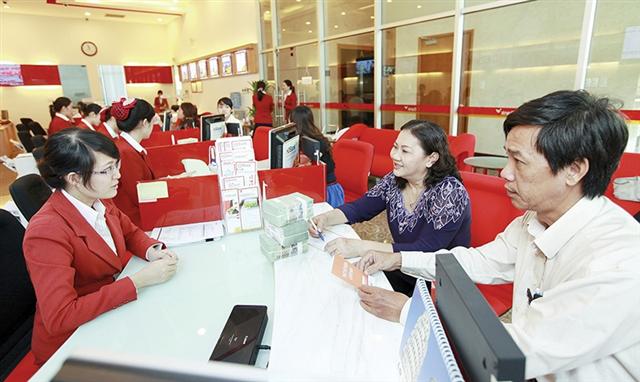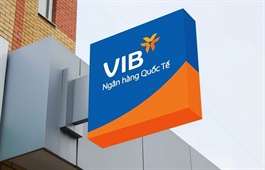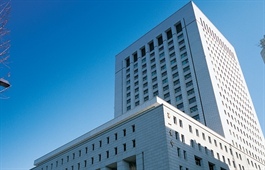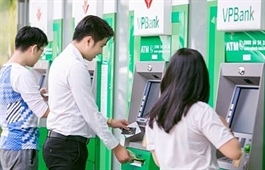Banks act carefully amid uncertainties
Banks act carefully amid uncertainties
As the global health crisis continues to inflict hardship on every sector, both international and domestic banks are becoming more risk averse in order to keep their businesses afloat, while trying to get rid of bad loans.

It is expected that most banks will follow a more prudent strategy this year, while aiming to accelerate next year. Photo Le Toan
|
The domestic economy showed significant signs of recovery, spurring higher demand for loans and higher growth in credit of lenders. Banks are also reducing their lending rates despite impacts on profits from their bread-and-butter lending activities.
Notwithstanding, each lender has their own lending appetite. Tran Thang Long, head of research at BIDV Securities told VIR, “In our opinion, banks would change the risk appetite to become more risk averse, and they would focus on increasing non-interest income which is the main growth factor for banks in the near future.” Long also brought up examples of state-owned banks slashing their credit exposure to the market and focusing on providing loans to their existing customers.
However, some banks have taken advantage of this unprecedented crisis to expand market share and deepen their foothold. Some lenders might seek more risk such as VPBank and MSB with their credit growth of 12 per cent.
VietinBank, for example, vows to create favourable conditions to assist clients, but not by easing lending standards.
“The early economic recovery also boosts massive opportunities for Vietnam to welcome multinational relocations and become a global manufacturing hub,” a representative of VietinBank told VIR. “Thus, we would place our focus on providing credit for essential sectors. There is a significant untapped potential for VietinBank to further accelerate global relocation by offering top-notch services to lure more high-quality foreign funds.”
Trinh Bang Vu, head of the Retail Business Division at Shinhan Bank Vietnam, noted the South Korean lender would continue to specialise in offering preferential lending rates for customers in need of home loans, car loans, or consumer loans.
“We always think and act with customers in mind with integrity and trust. For instance, home lending rates offered by Shinhan Bank are now deemed to be the most competitive on the market, while those for personal loans are only 1.16 per cent per month,” said Vu.
Private lender ACB, on the other hand, has enjoyed a high loan yield since it has given particular attention on retail banking and individual lending services.
However, the race among diversified retail banking products and services for small- and medium-sized enterprises is heating up as more competition enters, possibly placing a lower profit ceiling.
Nevertheless, Techcombank seems to be more conservative in selecting its customers. Bank chairman Ho Hung Anh emphasised that Techcombank only focuses on groups with high incomes and good repayment ability. For instance, Sun Group and Vingroup made up for a total 70 per cent market share, thus, the bank has chosen them as major customers in the resort segment.
The impact of COVID-19 on the bank has not been significant since the creditor does not have many customers belonging to severely affected sectors like aviation, textiles, and tourism. The customers of such sectors are recovering, except for Vietnam Airlines, Hung Anh noted.
In case of Vietcombank, the state-owned lender expects to increase its proportion of fee income and broaden its deposit base to include more retail clients. Most importantly, the bank expects its fees to improve after signing an exclusive bancassurance agreement with insurer FWD Group, with upfront fees the highest paid to any bank in Vietnam.
Vietnam International Bank (VIB) is slated to achieve a higher-than-average loan growth in the upcoming time, since the bank credit growth is driven by car loans.
Besides that, the Vietnamese government has decided to cut 50 per cent of registration fees for locally-manufactured and assembled cars till the end of this year. The reduction is aimed to help local businesses recover production and trade as well as stimulating consumption of cars, thus also paving the way for VIB lending activities.
Military Bank (MB), meanwhile, would lay stress on Mcredit – its consumer finance subsidiary – as an important profit centre for the bank. MB also plans to upgrade infrastructure and operations to better align the subsidiary with the bank’s risk appetite.
Nguyen Thi Thanh Huyen, financial analyst at KB Securities, believed that most banks currently are being more conservative with their credit activities which can be seen in the lower targeted annual credit growth for 2020 as presented at its in annual shareholders’ meeting.
“For the remainder of 2020, we expect that banks would maintain a prudent mindset in their loan activities in order to monitor their asset quality to avoid any unexpected consequences in the future,” said Huyen. “However, in 2021, if Vietnam avoids another wave of COVID-19 and the situation eases globally, banks could return to pre-pandemic levels or slightly lean forward in risk-taking to compensate for a gloomy 2020 performance.”

























